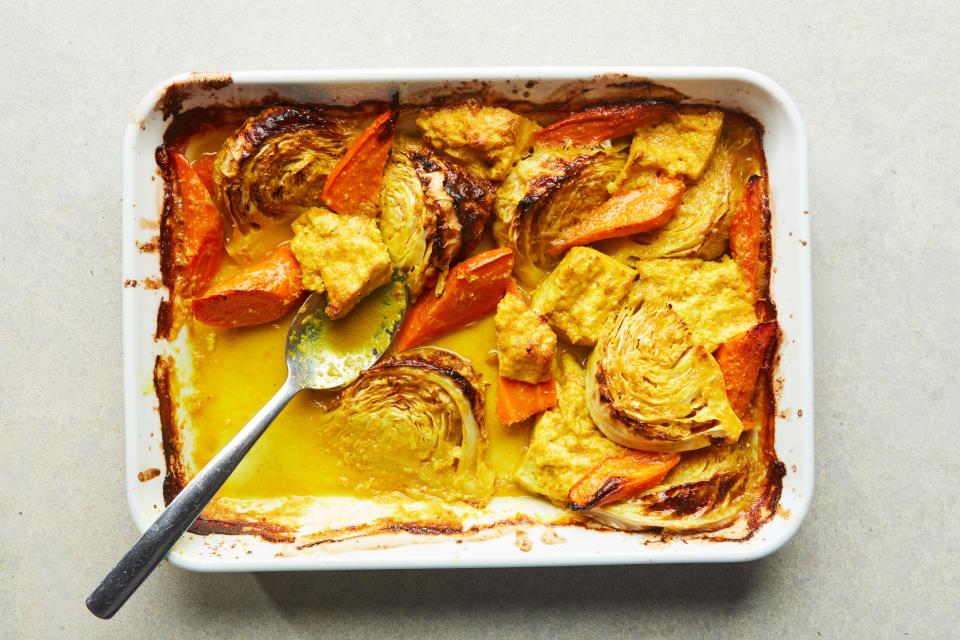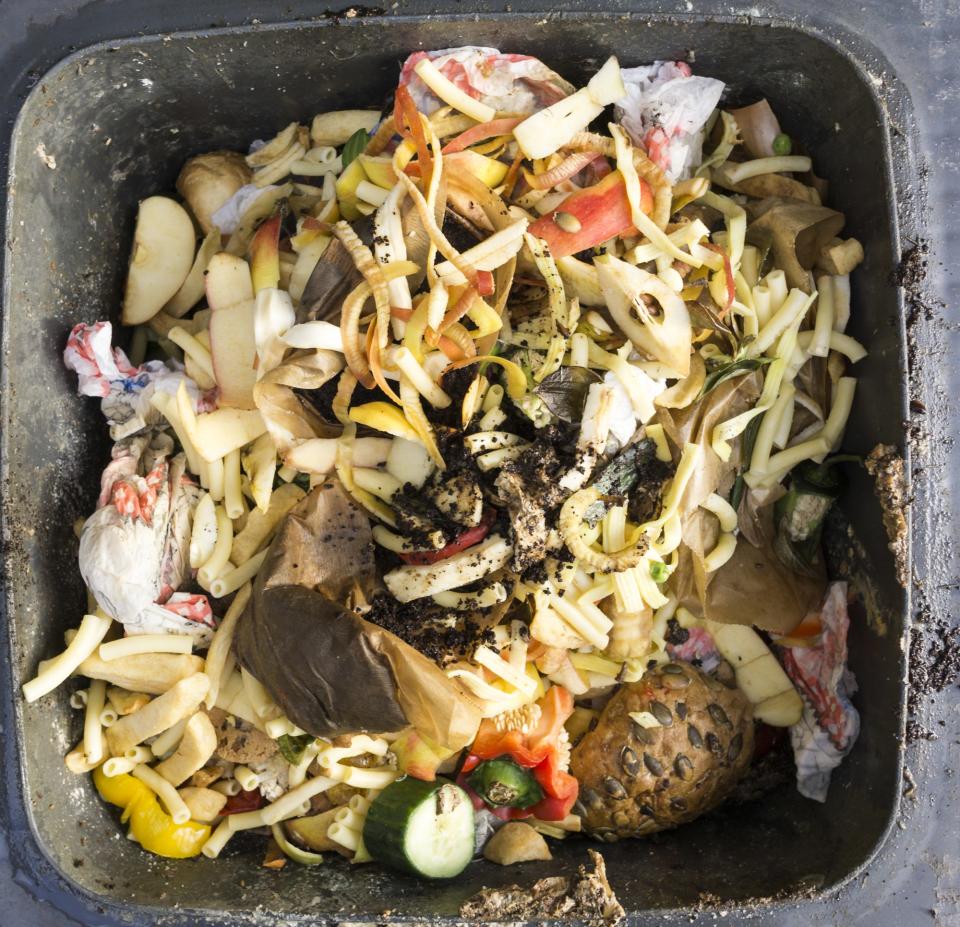Every Question About Sustainable Cooking, Answered by a Climate Change Expert
When the Epicurious team and I were putting together plans for this year’s COOK90, we knew that we wanted to add an environmental layer to the challenge. In a year when we saw climate-related devastation in Brazil, California, Australia, and too many other places to count, deciding to encourage people to eat sustainably was a no-brainer.
Then came the more difficult part: defining just what exactly “sustainable eating” is.
It’s well established that vegan diets have the smallest carbon footprint. It is equally established that when you tell people to eat vegan, they simply do not do it—globally, meat consumption has only increased.
Besides, lately some researchers have said that we don’t have to cut out anything at all, not even nefarious beef—simply cutting back on meat will make an impact, they say.
The space between going vegan and eating one less burger a week is vast. So we chose a spot in the middle. The COOK90 2020 meal plan cuts out beef, lamb, pork, and all poultry, and it is low(ish) on dairy. Seafood is in there, but only about once a week.
Is that sustainable? I got an expert on the line to find out. Richard Waite is an associate in the food program of the World Resources Institute, where he spends his days studying the impact that agriculture has on the planet. The COOK90 meal plan is indeed pretty sustainable, he told me during our hour-long conversation, which has been condensed and edited below. He then went on to tell me why.
We’ve defined “sustainable cooking” as cooking that is heavy on vegetables, heavy on grains, very low on animal protein, and low-ish on dairy. Would you call that “sustainable”?
I would say that's about right. Our research has basically shown that, yes, animal-based foods tend to be more resource-intensive than plant-based foods—in terms of land use, in terms of water use, in terms of greenhouse gas emissions.
Wasted food is wasted land.
When people ask me “what can I do to eat more sustainably?” there are two things I tend to think of immediately. The first is just minimizing food waste. And that's a big deal because a third of all food grown in the world is lost or wasted between the farm and the fork. It's even higher in the U.S. If food loss and waste were a country, it would be the third-largest greenhouse gas emitter after China and the U.S. So minimizing food waste is a big deal.
The second thing I tell people is that when you're thinking about what types of food you're putting on the plate, a diet that's higher in plants, lower in animal proteins, and especially lower in ruminant meats tend to be lower impact than the average American diet. I’m not talking about going completely vegetarian or vegan. I’m talking more like a plant-centered diet, with a lower amount of animal proteins, especially beef and lamb.

Vegetarian Rendang - RECIPE - V2
And the reason why you focus on food waste is because when food goes from our kitchens to a landfill, that food emits methane, right?
Well, it's actually even bigger than that. Wasted food represents land that was used to grow the food. So wasted food is like wasted land. Deforestation happens somewhere to produce more food, because the food we produced on land we already cleared, we threw away. So there's a land use aspect, there's a water use aspect, and then there are the greenhouse gas emissions.
But most greenhouse gas emissions associated with food actually happen before the food even leaves the farm. It's all about the emissions involved in the growing of the food. Things like transportation, or even the waste in the landfill, are less than the emissions that were actually involved in the growing of the food.
Tell me more about the emissions that happen in the growing process.
First, you've got the chemical fertilizer, [the manufacturing of which causes emissions]. And then when there's excess fertilizer, some of which will turn into nitrous oxide, which is a potent greenhouse gas. You have the energy used on farms, like running the tractors. With animal agriculture you have the cow burps. Even the manure that's left on pastures, that gives off greenhouse gas emissions. And then you also have the deforestation each year to clear more and more farmland every year—that releases co2 into the atmosphere as well. So it's a few different things that add up to agriculture and land use being about a quarter of global greenhouse gas emissions.
It takes twenty times the amount of land to produce a calorie of beef as it does a calorie of beans.
If the majority of emissions associated with food happens at the beginning of the process—the growing process—why is it important to curb food waste, which happens at the very end of the process?
Because if we were better about food waste, we wouldn't have to produce as much food.

Think about it this way: If globally we're throwing away about a third of the food that's grown, and growing that food and clearing the land to grow that food accounts for something like 24 percent of all greenhouse gas emissions, we're essentially throwing away eight percent of global greenhouse gas emissions. We wouldn't have to clear more forest, we wouldn't have to use more fertilizer, and we wouldn't have more cows burping methane if we were eating the food that we already grew.
You've mentioned deforestation a few times. Can you explain why deforestation is so problematic when it comes to climate change?
Sure. About a quarter of global greenhouse gas emissions comes from the agricultural and forest sector. Half of those emissions happen on farms and are the result of producing the food that we eat. The other half of them are from the tens of millions of hectares of forest that we clear every year, mostly to make room for more farms.
Clams, mussels, oysters and scallops are the most sustainable animal protein out there.
When you clear a tropical forest, all the carbon that was being sequestered on that land [is released into the atmosphere], especially if there's burning involved. Conversely, if you were to stop farming that land and let the trees grow back, you'd be drawing carbon down from the atmosphere, putting it back into the ground where it used to be. And that combats climate change.
Something else I wonder about is what I’ll call The Hierarchy of Problematic Meats. I understand that ruminant meat—beef, lamb, goat—is the biggest offender when it comes to climate change. But how bad is it compared to pork and poultry?
Basically you can think about it in terms of three categories of food. On the higher-emitting and higher land-using side, you have the ruminant meats: the beef, lamb, and goat. Globally it takes about twenty times the amount of land and emits twenty times the greenhouse gases to produce a calorie of beef as it does to produce a calorie of beans. So if you think about beans’ land use and greenhouse gas emissions, they are twenty times more efficient of a protein source than beef.
So you've got the ruminant meats on the high end, and then you've got plant-based foods on the lower end. And then in the middle you have basically all the other animal proteins. I'm pretty sure chicken is about three times as greenhouse gas intensive as beans. Remember I said beef was twenty times more intensive, so chicken is already a lot more efficient.

Thanksgiving Whole Roasted Fish
What about fish? Is it better from an emissions standpoint, than, say, poultry?
Farmed fish, if you average it all up together, is about as climate-friendly as poultry. So am I going to have chicken, or am I going to have tilapia? Resource-wise, they probably use a similar amount of land. Same thing with emissions.
Bivalves—clams, mussels, oysters and scallops—are the most sustainable animal protein out there, because they don't use any land, they don't need any feed, and they actually clean the water around them. So if you can get farmed bivalves, those are really sustainable.
But then it gets kind of complicated. There are many different types of seafood. Is it farmed? Is it wild? Where was it caught or farmed? All of those things have a bearing on how sustainable and climate-friendly it is. If you want to drill down, go on websites like Monterey Bay Seafood Watch and do a deep dive on the species. That's generally what I do.
On to dairy—why is it lower in emissions than beef?
Over its life, a dairy cow will provide much more food in terms of calories, protein, and other nutrients, than a beef cow. Because it's milked over and over and over and over throughout its life, versus the beef cow, which just turns into beef at the end.
Okay, but if I stop eating beef, is that going to make an impact? Even if I go full vegan, how is that going to prevent rainforests from burning? I mean, my stove and oven burn gas. I literally burn fossil fuels to prepare my “sustainable” meals.
There are lots of different permutations of this type of thinking. And you know, one classic example of it that happened just a couple weeks ago at the Golden Globes, when they decided this year to send a message that they care about climate change by serving an all-vegan meal. Instantly you get people who are like: Oh, well isn't it great? We’re finally drawing attention to the next frontier of climate action and climate-friendly eating. Awesome.
And then you get the instant backlash of: Well, didn't all these celebrities fly in on planes? Aren’t they all just, like, rich people who jet around everywhere? And so they're going to eat one vegan meal and we should applaud them?
I spend a lot of time talking about reducing emissions from the agriculture and food sector, and inevitably, once a day, someone's like, well, but shouldn't we just be like flying less? Shouldn't we not drive to work? And it's like yes, and we also have to take action on food and ag. Because if we don't take action on food and ag, food and ag and deforestation emissions are going to grow to the point that by 2050 we're blowing the majority of the carbon budget just on food and ag.
What I always come back to is that the climate problem is so big and so urgent at this point that we're out of time to be able to choose between our favorite climate solutions.
Originally Appeared on Epicurious

